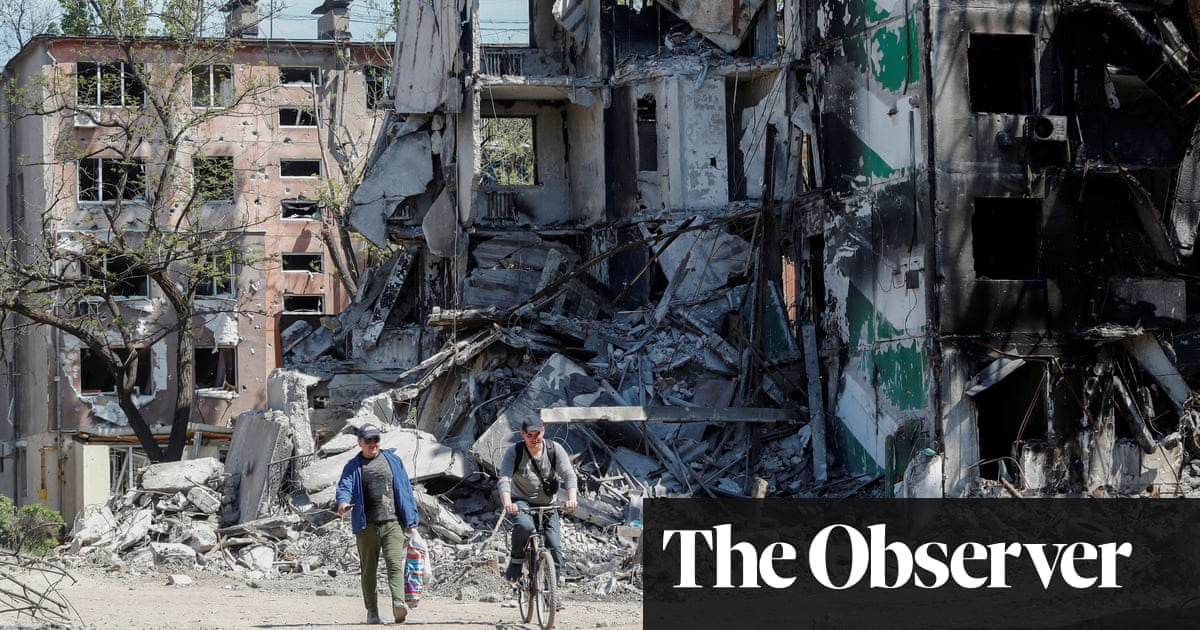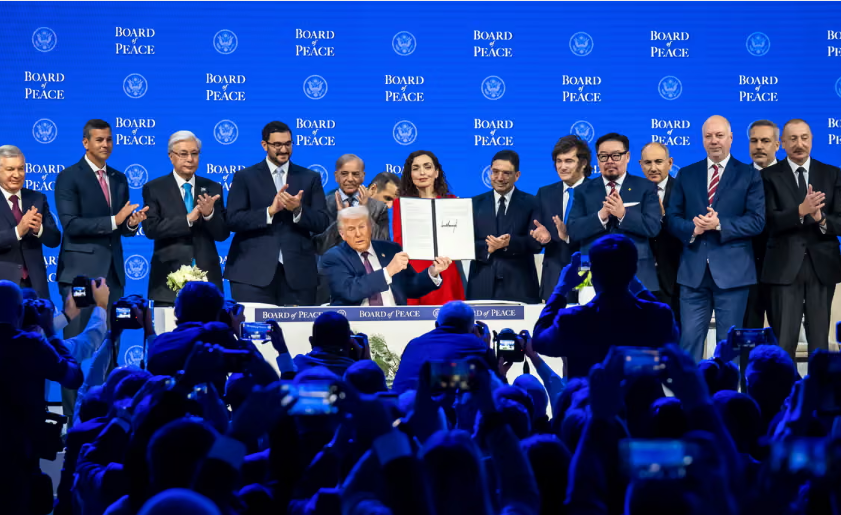Moscow set to call referendum on Mariupol joining Russia, says Ukraine
Moscow is preparing to hold a referendum in Mariupol on whether the city will join Russia, Ukrainian officials have claimed, following the announcement of a similar poll in Georgia’s breakaway region of South Ossetia.
Petro Andryushchenko, an adviser to the port city’s mayor, who is operating in exile, said sources among those remaining among its ruins believed a vote on its future was in the making, even as residents were going without food and water.
The ruins left of Mariupol, a sea resort once home to 400,000 people, are largely occupied by Russia, although as many as 2,000 Ukrainian soldiers are holding out in the sprawling Azovstal steelworks by the port in the face of remorseless shelling.
Andryushchenko told the Observer that an announcement of a referendum could come as early as Sunday, although he said there was no evidence yet of polling stations being established.
He said on Saturday: “We have some information that the Russian authorities are preparing a referendum and could even call it tomorrow, but we don’t know yet if this is the case. But we see lots of integration of Mariupol into the Russian system, the education system, the banking system.”
South Ossetia leader Anatoly Bibilov had announced on Friday he would hold a referendum on joining Russia on 17 July, claiming “we are coming home” and citing his people’s “historic aspiration” to join Russia.
Moscow’s initial plan to seize the whole of Ukraine failed after they lost the bloody battle of Kyiv. The Kremlin has since focused on securing a swathe of land around the east and south-east of the country.
The development came as Ukrainian officials were able to claim some major military successes, with the mayor of Kharkiv saying that Russian forces had now withdrawn “far out” from Ukraine’s second biggest city.
The general staff of Ukraine’s army echoed the comments, reporting the Russians had left their positions around the north-eastern city, which is 31 miles (50km) from the Russian border.
The remorseless shelling endured by the civilian population in the region had also paused, according to the regional governor, Oleh Sinegubov, while Ukrainian forces were launching a counteroffensive near the city of Izyum, 78 miles south of Kharkiv.
The Azovstal steelworks in Mariupol, where as many as 2,000 Ukrainian soldiers are holding out. Photograph: Alexander Ermochenko/Reuters
But Putin’s forces have captured territory in the Donbas region, including Rubizhne, a city with a prewar population of around 55,000, and the situation appears increasingly grave for the remaining soldiers trapped in the Azovstal steelworks.
Speaking on at a press conference in Kyiv, Natalia Zarytska, the wife of Bogdan Sements, who is among those trapped in the steelworks, called on China to intervene and help liberate the remaining people.
She said: “Strong leaders cannot stand aside when there is evil. After all these negotiations, there is one person worldwide who it would be difficult for Vladimir Putin to refuse. We hope that strong and good China can make difficult decisions for the good.
“We ask the esteemed premier of China, Xi Jinping, to express love and care for global values and eastern wisdom and to join the process of rescuing the defenders of Mariupol.”
Hanna Ivleieva, a military service person and wife of a soldier in Mariupol, said only those who had lost their arms or legs were not fighting among the Ukrainian forces left in the city.
She said: “I am a soldier with the Marines. My husband, my commanding officers, and close friends are now in Azovstal.
“They were the first to engage in the battle in this war. We are proud of all Azovstal defenders, as they are stronger than the steel used to be produced here.
“But we do not want them to be killed there. We need our heroes alive. We ask the President of China as Putin’s economic partner to undertake all the necessary procedures and rescue our guys”.
The Ukrainian president, Volodymyr Zelenskiy, has said talks with Moscow on extracting a “large number” of wounded defenders and some medics out of the steelworks in return for the release of Russian prisoners of war were “very complex”, adding that Kyiv was using influential intermediaries.
Ukraine’s deputy prime minister, Iryna Vereshchuk, told local TV on Saturday that efforts were now focused on evacuating about 60 people.
Ibrahim Kalin, a senior foreign policy adviser to Turkey’s president Recep Erdoğan, said on Saturday that the Turkish government had proposed to Moscow a sea evacuation of the wounded soldiers.
As the war grinds on, foreign ministers from the world’s seven richest countries, the G7, warned at the end of a three-day meeting in Germany that millions of people will starve to death unless Russia allows the export of Ukrainian grain from blockaded ports. The G7 governments said Putin was pushing 43 million people towards famine by refusing to allow cereals to leave Ukraine via Black Sea ports.
“Russia’s unprovoked and pre-meditated war of aggression has exacerbated the global economic outlook with sharply rising food, fuel and energy prices,” they said in a joint statement. “Combined with Russia blocking the exit routes for Ukraine’s grain, the world is now facing a worsening state of food insecurity and malnutrition … This is at a time when 43 million people were already one-step away from famine.”Canada’s foreign minister, Mélanie Joly, told reporters: “We need to make sure that these cereals are sent to the world. If not, millions of people will be facing famine.”
Zelenskiy: Ukraine retakes more ground as Russia suffers ‘worst aviation losses in decades’ – video
The G7 countries said they would expand sanctions on Russia and that they would not accept the new borders Russia is seeking to draw.
They said: “We will never recognise borders Russia has attempted to change by military aggression, and will uphold our engagement in the support of the sovereignty and territorial integrity of Ukraine, including Crimea, and all states.
“We reaffirm our determination to further increase economic and political pressure on Russia, continuing to act in unity.”
They called on China not to aid Putin and “to desist from engaging in information manipulation, disinformation and other means to legitimise Russia’s war of aggression against Ukraine”.
Three weeks before Putin launched his war in Ukraine, the Russian president signed a pact with his Chinese counterpart that said there would be “no limits” to the two countries’ cooperation.













